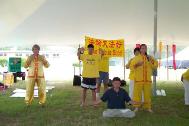(Clearwisdom.net) Clearwisdom correspondent Lin Xinyuan reports:
The three-day G8 Summit continued in Georgia on June 9, 2004. In order to let more people know about the brutal persecution Falun Gong practitioners are facing in China over the past nearly five years and to help stop the tragedy, Falun Gong practitioners from across the US continued holding activities near the conference site in Brunswick and other places to explain the facts to the public about the persecution of Falun Gong. It rained intermittently, but practitioners kept practicing the exercises, holding banners and conducting an exhibit of torture methods used on Falun Dafa practitioners in China.
|
|  A banner reading "Bring Jiang to Justice" |
|  Exercise demonstration |
|
|  The media conducts interviews |
|  Explaining the facts about Falun Dafa to passersby |
|  Explaining the facts about Falun Dafa to passersby |
Police chief's kind support:
The police chief in Brunswick came to where Falun Gong practitioners practiced the exercises and had a conversation with practitioners. He wanted to learn more about the persecution of Falun Gong in China. He kept nodding while listening to practitioners' explanation. After that, he immediately called other police officers to come and see the exhibit. Before leaving, he said "Thank you" repeatedly.
Support from a lawyer
A lawyer who worked opposite where practitioners demonstrated the exercises came over with a video camera to talk with practitioners. He said that he would videotape practitioners and show his wife so they could discuss they could help Falun Gong practitioners. He repeatedly expressed that practitioners had done well and behaved righteously.
Support from folk groups
Falun Gong practitioners were invited to attend a rally of folk groups and the media outlets held by the seacoast community college in Georgia. The practitioners demonstrated the exercises, made speeches, clarified the truth and exhibited truth clarification display boards. The audience listened to them attentively and actively raised questions. The organizer repeated their appreciation and had a photo taken with practitioners. They thanked practitioners for bringing Falun Dafa's message to local residents, and expressed their support.
Four young Falun Gong practitioners' endurance
Four young Falun Gong practitioners held a banner in the rain for about nine hours, and insisted on holding it when other practitioners wanted to substitute them.
A practitioner's feeling about acting as a policeman
Falun Gong practitioner Mr. Li acted as a policeman who dragged a practitioner with a rope on the ground. He said, "I don't know how to act, and I've never acted in a play before. Thinking of practitioners who are suffering persecution in China, and in order to help them, I can do anything. I act as a policeman who dragged a practitioner with a rope. If I was indeed asked to do so, I couldn't do such a thing. Those malicious policemen can even do such cruel things. Thinking of practitioners in Mainland China who have been suffering so much, I'm very sad. In order to let everyone know of the Jiang group's evildoings, I'm happy that I can do my part to help."
He also said that after seeing practitioners suffer, he was very sad, but he felt their greatness. They do not succumb to heavy pressure and they are really remarkable. He was proud of being a Falun Gong practitioner.
Mrs. Gong's experiencing of being forced to do slave labor:
During torture exhibition, Mrs. Gong and her husband demonstrated how Chinese labor camps force Falun Gong practitioners to do slave labor. Mrs. Gong recalled her experience of being forced to do slave labor in Mainland China. She was sentenced to one year of forced labor in 2000 for traveling to Tiananmen Square to clarify the truth about Falun Gong. She was subjected to inhuman persecution in Beijing's Tuanhe Dispatching Center and other places, including making slave labor products, i.e.: packing chopsticks, wrapping tonics, stringing beads and other labor. They were forced to pack two types of disposable chopsticks; one was a type of disposable chopstick that was wrapped with a crisp white paper and used in small restaurants. The sanitary condition in labor camps was very poor. The prisoners could not take a shower, or wash their hands for a long period of time. The rooms were humid and damp and the ventilation was not good. Their clothes were dirty, without soap, some clothes grew mold in the humid conditions. Under such foul circumstances one could imagine how unsanitary the chopsticks would be. Though the package was beautiful, it was quite unsanitary. Yet, the packaging falsely stated the product was "sanitary chopsticks" or "sanitary and sterilized chopsticks." Those who were forced to do slave labor had filthy hands with long untrimmed fingernails as they were not allowed to trim them. Those elderly people whose hands were not very flexible, and those who had injuries, or packed slowly, were verbally abused, beaten and forced to work overtime. The other types of chopsticks were packed with plastic bags with beautiful trademarks, but they were also produced in the same dirty environment, and they slated to be delivered to hotels and restaurants.
Category: Rallies & Protests





